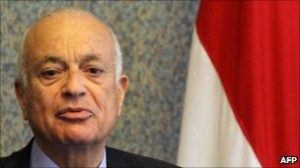
Syria has delayed a visit by the head of the Arab League scheduled for Wednesday, citing unspecified “circumstances beyond our control,” as anti-government protesters continued their calls for regime change.
The Arab League secretary general had been commissioned to deliver a 13-point document to Syrian President Bashar al-Assad outlining the 22-nation organization’s plans to bring an end to the crackdown. He was to have arrived in Damascus on Wednesday.
“Syria has asked Arab League Secretary General Nabil Al Araby to delay his visit to Damascus due to circumstances beyond our control,” the official SANA news agency said Tuesday, adding that a new date will be set for his visit.
Al Araby’s Cairo office confirmed that the “trip has been postponed with no alternative date on the request of the Syrians.”
Syria has been engulfed in public protest for months, and the regime has been accused internationally of a crackdown on peaceful demonstrators. A spokesman for a Syrian opposition group based in Egypt said he sees this effort for a peaceful solution “as the last attempt by the Arab League before an international intervention.”
The proposals included “the withdrawal of the army from the Syrian streets, release of all the prisoners detained during the revolt and the beginning of an open dialogue toward real political reforms,” Mohamed Al Zeibaq, spokesman for the Coalition of Free Syrians, said from Cairo.
The document also proposed that Assad conduct parliamentary elections by the end of the year and presidential elections by the year 2014, Al Zeibaq said.
The United Nations has reported more than 2,200 people killed in Syria since February, including more than 350 people since security forces stepped up operations against demonstrators during the Muslim holy month of Ramadan.
According to the opposition Local Coordinating Committees of Syria (LCCS), at least 2,824 people (civilians and security forces) have been killed and their names documented so far since the Syrian uprising started in March.
CNN cannot independently verify these claims, because the Syrian government has repeatedly denied requests for journalists to report inside Syria.
The violence claimed 10 more lives on Tuesday, according to the London-based Syrian Observatory for Human Rights, including five whose bodies were found in the Homs neighborhoods of Souk al Hashish and Hamam al Pasha earlier in the morning. Two died in an attack on the Bayda neighborhood, also in Homs; two were shot to death at a military checkpoint in the industrial area of Ristun; another was killed in the Damascus suburb of Zmelka.
Aleppo joined other Syrian cities protesting against the government Tuesday after one of the city’s well-known scholars, Ibrahim Salqini died. The official cause of his death was a heart attack, according to government-run SANA news.
Activists raised doubts about the circumstances of his death. The scholar signed a document, which CNN has obtained, along with heads of mosques from all around Syria, condemning government violence against religious sites.
Thousands of mourners attended his funeral, according to an activist and the Local Coordination Committees of Syria.
Mourners chanted anti-government slogans, including “better death than humiliation,” according to the activist.
Syrian security forces started firing when the demonstration reached the cemetery, according to the same activist.
Several people were injured and many detained, said the activist and the LCC.
Officials do not usually comment on opposition allegations concerning the killing or wounding of protesters.
The Arab League last week publicly called for restraint and an end to the violence in Syria.
The International Committee of the Red Cross on Monday was granted access to a detention facility in Syria for the first time since unrest broke out in the country, the committee’s president said after meeting with Assad.

Leave a Reply
You must be logged in to post a comment.